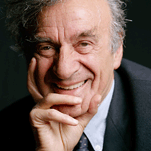Elie Wiesel was so much. A boy from Siget who experienced and saw what no person should ever. He became a witness. A voice for those who were murdered by the Nazis. A voice for those whose memories were under constant threat of eradication. He was an author. He was a professor. He was a voice of morality and ethical clarity. He was our Rabbi in the greatest of our traditions. He was a Man. He was a Jewish Man. He was a witness. He was our conscious. With calmness and wisdom he spoke to the student, to the the Cambodians, to the Rwandans, to the survivors; he told Presidents with a smile and a spark in his eye; but tell Presidents he did; he spoke truth to power; because he knew he was, more then anything, a witness that had to remain true to the murdered and to their memories; for if we do not, according to Elie Wiesel, it would be as if we murdered them again.
In 2003 at the United Nations in New York, Elie Wiesel warned us about the emerging emergency that we were beginning to experience with antisemitism globally. He taught that, “neutrality helps the oppressor, never the victim. Silence encourages the tormentor, never the tormented”. As Jihadi reactionary social movements flourish and bring carnage and celebrate their culture of death; as democratic forces “engage’ these genocidal movements, invest in their economies, and confuse their own constituents with politically correct rhetoric; we will miss the words, the clarity, the wisdom and moral leadership of Professor Elie Wiesel.
Among the numerous awards, the Nobel Peace Prize, hundreds of honorary doctorates, and national prizes, Elie Wiesel was also the Honorary President of the Institute for the Study of Antisemitism and Policy since its inception. He was kind and supportive always towards the many individuals and organisations fighting antisemitism and defending the rights of the Jewish People.
Charles Asher Small, ISGAP
– Elie Wiesel
“Ani Maamin: A Song Lost and Found”
I believe, Abraham,
Despite Treblinka.
I believe, Isaac,
Because of Belsen.
I believe, Jacob,
Because and in spite of Majdanek.
Dead in vain,
Dead for naught,
I believe.
Pray men.
Pray to God,
Against God,
For God.
I believe.
Whether the Messiah comes,
I believe.
Or is late in coming,
I believe.
Whether God is silent
Or weeps,
I believe.
I believe for him,
In spite of him.
I believe in you,
Even against your will.
Even if you punish me
For believing in you.
Blessed are the fools
Who shout their faith.
Blessed are the fools
Who go on laughing.
Who mock the man who mocks the Jew,
Who help their brothers
Singing, over and over and over:
I believe.
I believe in the coming of the Messiah,
And though he tarries,
I wait daily for his coming.
I believe.
– Elie Wiesel
“Ani Maamin: A Song Lost and Found”
Charles Asher Small
Founding Director and President of the Institute for the Study of Global Antisemitism and Policy

